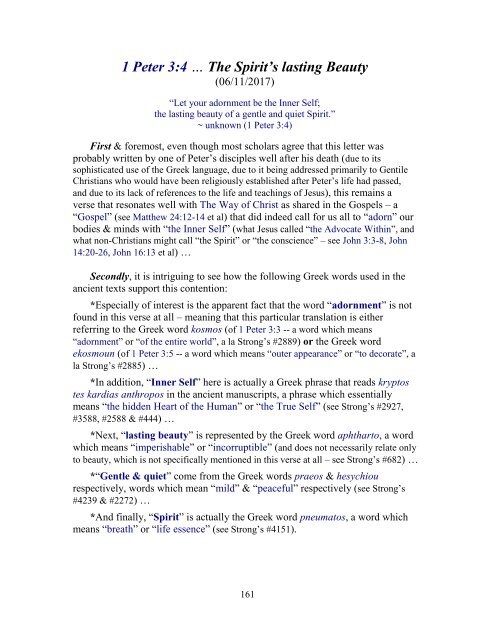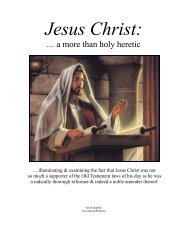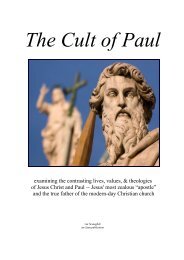My Favorite Verses - Vol V (Feb 17 to Jun 17)
An illustrated collection of brief commentaries on some of the Bible’s most beloved (and some of its least understood) passages, parables, verses & sayings
An illustrated collection of brief commentaries on some of the Bible’s most beloved (and some of its least understood) passages, parables, verses & sayings
You also want an ePaper? Increase the reach of your titles
YUMPU automatically turns print PDFs into web optimized ePapers that Google loves.
1 Peter 3:4 … The Spirit’s lasting Beauty<br />
(06/11/20<strong>17</strong>)<br />
“Let your adornment be the Inner Self;<br />
the lasting beauty of a gentle and quiet Spirit.”<br />
~ unknown (1 Peter 3:4)<br />
First & foremost, even though most scholars agree that this letter was<br />
probably written by one of Peter‟s disciples well after his death (due <strong>to</strong> its<br />
sophisticated use of the Greek language, due <strong>to</strong> it being addressed primarily <strong>to</strong> Gentile<br />
Christians who would have been religiously established after Peter‟s life had passed,<br />
and due <strong>to</strong> its lack of references <strong>to</strong> the life and teachings of Jesus), this remains a<br />
verse that resonates well with The Way of Christ as shared in the Gospels – a<br />
“Gospel” (see Matthew 24:12-14 et al) that did indeed call for us all <strong>to</strong> “adorn” our<br />
bodies & minds with “the Inner Self” (what Jesus called “the Advocate Within”, and<br />
what non-Christians might call “the Spirit” or “the conscience” – see John 3:3-8, John<br />
14:20-26, John 16:13 et al) …<br />
Secondly, it is intriguing <strong>to</strong> see how the following Greek words used in the<br />
ancient texts support this contention:<br />
*Especially of interest is the apparent fact that the word “adornment” is not<br />
found in this verse at all – meaning that this particular translation is either<br />
referring <strong>to</strong> the Greek word kosmos (of 1 Peter 3:3 -- a word which means<br />
“adornment” or “of the entire world”, a la Strong‟s #2889) or the Greek word<br />
ekosmoun (of 1 Peter 3:5 -- a word which means “outer appearance” or “<strong>to</strong> decorate”, a<br />
la Strong‟s #2885) …<br />
*In addition, “Inner Self” here is actually a Greek phrase that reads kryp<strong>to</strong>s<br />
tes kardias anthropos in the ancient manuscripts, a phrase which essentially<br />
means “the hidden Heart of the Human” or “the True Self” (see Strong‟s #2927,<br />
#3588, #2588 & #444) …<br />
*Next, “lasting beauty” is represented by the Greek word aphthar<strong>to</strong>, a word<br />
which means “imperishable” or “incorruptible” (and does not necessarily relate only<br />
<strong>to</strong> beauty, which is not specifically mentioned in this verse at all – see Strong‟s #682) …<br />
*“Gentle & quiet” come from the Greek words praeos & hesychiou<br />
respectively, words which mean “mild” & “peaceful” respectively (see Strong‟s<br />
#4239 & #2272) …<br />
*And finally, “Spirit” is actually the Greek word pneuma<strong>to</strong>s, a word which<br />
means “breath” or “life essence” (see Strong‟s #4151).<br />
161


















